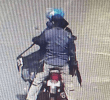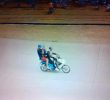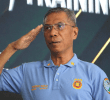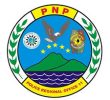DAVAO CITY, Philippines – He is unorthodox as he is popular. He gained fame (or notoriety) as a no-nonsense mayor in his fight against criminality. A good source of sound bite, he is his own effective propaganda machine. He is both loved and loathed.
To those who fear him, Mayor Rodrigo Duterte is “the punisher,” as Time magazine described him three years ago. To those who respect him, he is the man who keeps the peace. To his political adversaries, he plays dirty. To others whose lives he touched through his generosity, his is a heart of gold. To keen political observers, he is nothing but a shrewd politician who knows how to play the game.
“He knows the psychology of the masses, and knows how to deal” with the different groups, the military, the business and the underground left, said Sister Josephine Bacaltos of the Religious of the Good Shepherd who is the mayor’s consultant for social services.
Each election year, Duterte’s popularity always translated into votes. His political machinery, consolidated through time, is more than enough to catapult him to any elective seat he would aspire for. A presidential aspirant would need his endorsement. Duterte, now 60 years old, never lost an election bid since he set foot on City Hall almost two decades ago.
“He understands the system. No wonder he’s in politics because he understands politics,” said city councilor Emmanuel Galicia, who once was Duterte’s boss when the future mayor worked as a prosecutor during martial law.
“I grew up in politics because my father was governor. So I have a good training on how to deal with the problems of people,” Duterte told davaotoday.com last week.
In the ’50s, his father, Vicente, was governor of Davao, which at the time encompassed Cateel in Davao Oriental down to Abad Santos in Davao del Sur. His mother, Soledad, was a teacher for 26 years and a civic leader who once headed former President Cory Aquino’s “Yellow Friday Movement” here and the regionalized peace process with the communists in the ’80s.
“I never really dreamed that he will follow the footsteps of the father,” Mrs. Duterte, known as Nanay Soleng, told davaotoday.com in an interview two weeks ago.
She described her son as an “ordinary kid” but that he “ventured where others do not.” At age 14, on his own, Duterte piloted a small plane, buzzing outside their house, to the consternation of his parents.
Nanay Soleng said her son was always out of the house, always looking for some action elsewhere. He was such a problem child that his father exiled him to Digos, Davao del Sur, where he ended up finishing his high school years.
Duterte went on to finish law at San Beda Law in the early ’70s. He then had a stint as an instructor in the national police academy before joining government as a prosecutor.
In 1988, when Duterte was being wooed to run for mayor against Zafiro Respicio, Nanay Soleng told her son: “One politician in the family is enough.”
Duterte was the OIC (officer-in-charge) vice mayor then and had served in the government as special counsel until he became assistant fiscal before he was appointed OIC after the Edsa uprising. As special counsel, he investigated and prosecuted cases such as those involving police and military personnel, and subversion and rebellion cases filed against alleged members of the communist New People’s Army.
His mother, as well as Galicia, would say the mayor was fearless, and that time, even though martial law was still in effect, even recommended the prosecution of an abusive military personnel. “When other prosecutors did not dare, Duterte was never afraid to do it,” Galicia said. He described the young prosecutor as serious in his work, yet he joked around. Whenever he skipped office, Duterte could be found at the shooting range. “He loved guns,” Galicia said.
Cory Aquino’s assumption to power did not stop the bloody encounters between the NPA and the military in the Davao hinterlands. Evacuations ensued and the infamous fanatical group Alsa Masa was formed in the city to counter the underground movement’s popular influence, especially in Agdao, and the NPA sparrow units that targeted military and police personnel.
Duterte, as the OIC vice mayor, was in the thick of things. His help was sought by cause-oriented groups, said Sister Josephine, who was with Duterte in an organization in the ’80s called the Nationalist Alliance for Justice, Freedom and Democracy, together with other human-rights advocates and lawyers like Larry Ilagan. He would attend march rallies, help evacuees from the Davao City hinterlands, and according to lawyer Carlos Isagani Zarate, worked for the release of military personnel held captive by the NPA.
In those visits in the NPA-influenced mountains of Davao, in Paquibato and Mandug, the “people would egg him to run for mayor,” said Zarate, who used to cover Duterte at that time for the now defunct Media Mindanao News Service. “I don’t have any plans for that, but I”ll do whatever the people want me to do,” Duterte would reply to such pleas, Zarate said.
The third time he brought up with his mother the matter of running for mayor, Duterte had already decided. He told her: “My, they said I should not tell you, and we won’t spend a single centavo.”
His uncle, Alejandro “Landring” Almendras, who was himself a seasoned politician and a logging magnate, supported Duterte’s first foray into politics, as well as other politicians identified with the dictator Marcos such as Manuel Garcia, Elias Lopez and Chinese businessman Ricardo Limso. Duterte was up against Respicio, who had the full backing and endorsement of the Aquino administration and businessman Jesus V. Ayala.
The mayoralty race in 1988 was a toss between Duterte and Respicio but three others were likewise running, including Alsa Masa cult leader Juan “Jun” Pala. Respicio and Pala had counted on the Alsa Masa votes while Duterte had been assured of solid votes from the NPA-influenced hinterlands of the city.
Duterte won. Afterward, he made it a point to shake off the communist tag that Respicio had used against him during the campaign.
Under his watch as mayor for three terms, and with a fresh mandate after his three years in Congress, Duterte not only went after criminals; he tried uniting the different tribes and cultures in the city, as well as the other political groups.
Duterte designated deputy mayors that represented the Lumads and the Moro in the city government, a first in the country which was later copied in other areas. While he is open to talking with revolutionary groups such as the NPA and the Moro Islamic Liberation Front, he has also welcomed and supported the so-called anti terrorism Task Force Davao into his arms despite protests from the progressive groups.
In the elections since 2001, he had endorsed left-leaning groups like Bayan Muna and accommodated progressive groups into his ticket.
But Duterte’s main political opponent, lawyer Benjamin de Guzman, saw things differently about his former mentor. “Wasteful, neglectful and incompetent” was how he assessed Duterte’s three-year watch at City Hall after Duterte made a comeback in the 2001 elections. De Guzman alleged, in a letter he sent to Mindanao Daily Mirror columnist Bert Tesorero last year, that Duterte had been absent most of the time and left the reins of the city to his deputies.
De Guzman had once ruled the city for three years after the 1998 elections, when Duterte ran and won as congressman of the first district. Both de Guzman and Duterte campaigned for each other in that elections. When the next election came in 2001, Duterte made a comeback as mayor, thinking that de Guzman would step aside for him. But de Guzman sought reelection, pitted himself against Duterte, and formed an alliance with Rep. Prospero Nograles.
If the results of that elections were an indication – Duterte won but only four city councilors under him were victorious — Duterte had crawled back to the once mighty kingdom that he had built for nine years.
Last year’s elections provided a glimpse of Duterte’s political shrewdness. He was hell-bent on smashing de Guzman in the polls. The result: Duterte’s votes were more than double than that of de Guzman’s, and majority of the council candidates under Duterte’s ticket now sit in the City Council.
But there were accusations of irregularities. De Guzman accused Duterte’s camp of cheating, calling the election a “farce.” He pulled out his poll watchers even before the counting started, alleging that many voters had been disenfranchised and the camp of Duterte were into vote-buying and coerced the people to vote for Duterte.
Duterte knows the “art of systematic cheating,” a source close to de Guzman, who asked not to be named, alleged. Duterte’s camp, the source said, had put up a “parallel Comelec” (Commission on Elections) in one of the houses of Duterte’s biggest allies. Here, the votes were allegedly “closely monitored.” The allegations, however, remain unproven; no protest had been filed in the Commission on Elections against Duterte.
Duterte had also formed an alliance with President Gloria Macapagal-Arroyo, who herself had been dogged by election fraud charges, and, in effect, with Nograles, who had been the mayor’s foremost nemesis. Nograles is a stalwart of the president’s political coalition.
De Guzman, despite his alliance with Nograles, had then become the opposition’s candidate. He had been endorsed by the camp of Fernando Poe Jr., Arroyo’s main challenger in the polls. But a few months before the May elections, the opposition in fact had endorsed Duterte. Then, in March, it endorsed de Guzman, then promptly recalled the endorsement two days later.
De Guzman finally became Poe’s official candidate in Davao City . But reflecting perhaps the ambivalence of the opposition toward de Guzman, or perhaps because it didn’t want to offend Duterte, Poe and fellow actor Eddie Garcia endorsed de Guzman by raising his hands for a photo-op — in Iloilo City.
Poe, despite the fact that Davao is a traditional opposition bailiwick and despite his immense popularity, lost in the city.
De Guzman, meanwhile, tried his best against Duterte. He challenged Duterte to a debate on topics related to “effective, efficient and productive” governance. He also exploited the “personal” issues that had cropped up against Duterte, who acknowledged during the campaign last year his relationship with several women. In an interview with davaotoday.com last week, Duterte lambasted de Guzman’s camp for the “black propaganda” against him, which he said had been one of the low points in the campaign.
De Guzman never got his wish for a debate. His staid personality – he lacked the all-important charisma with the crowd – was no match to Duterte’s colorful, if offensive, rhetoric that the public loved.
But de Guzman managed to coax some answers from Duterte on the question of summary executions, which de Guzman had used in the campaign against Duterte (although the killings actually lessened during the campaign). In one sortie in Marilog, Duterte, according to media reports, replied to the charge that he was behind the killings: “It’s true,” he said, “but who were these people that I killed? They were fools!”
The crowd loved such one-liners from Duterte, despite the fact that it could be self-incriminating. Duterte had entertained his public and such an admission of guilt got lost in the political din.
(Back in the ’80s, when Duterte was still a neophyte in politics, he once told a journalist that he was “frustrated” to see suspected criminals, despite evidence against, being acquitted of their crimes. He said then that what he liked about the NPA is their “brand of rendering swift justice.” He has declared to all that he would get rid of criminals through any means necessary. He takes pride in the fact that, as far as he is concerned, that is happening.)
Almost two decades after first entering politics, Duterte’s political savvy only improved and has grown practically unmatched within the city’s political elite. Today, as he once told his good friend, the evangelist Apollo Quiboloy, he has “no more mountains to climb.” He is politically secured and has turned to building his legacy, which to him is a peaceful and crime-free city. (With a report from Grace Uddin/davaotoday.com)










